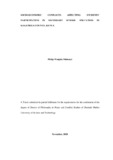| dc.description.abstract | The importance of education in contemporary world order cannot be gain said. Education is the first step towards human empowerment. Education plays a vital role in the development of human capital that is imperative in the modern technological and information age. However many factors, for example individual and household characteristics, socio-economic status, school related factors and government policies, have substantial impact on the participation in education in general and secondary school education in particular. Studies indicate that one’s educational success depends very strongly on social and economic status of the family of the learner. Families where parents are advantaged socially, educationally and economically foster a high level of success in their children, the converse is also true. Studies have also indicated that the type of school a child attends is a function of family socio-economic status and influences academic participation and achievement. This study set out to investigate the social and economic conflicts affecting students’ participation in secondary school education in Kakamega County. This study had three objectives: to examine the nature of social and economic conflicts affecting students’ participation in secondary school education in Kakamega County, assess the relationship between social and economic conflicts and students’ participation in secondary school education in Kakamega County and evaluate strategies used to improve participation in secondary school education in Kakamega County. This study used a conceptual model where social and economic conflicts as represented by poverty and drug and substance abuse on one side and effects on students’ participation in secondary school education on the other. The measurable indicators for participation included all aspects of wastage. The research design adoptedfor this study was ex post facto in which cross cultural survey and correlational design and evaluation were used. The study population was 20274 students in county and sub county schools in the three sampled sub counties of Kakamega North, Mumias East and Kakamega East as well as 63 principals, 63 guiding and counselling teachers, parents and guardians, religious leaders, chiefs, NG-CDF managers and Sub County Directors of education. Purposive sampling was used to select the three sub counties, stratifiedrandom sampling was used to select the schools while purposive, simple random and stratified random sampling were used to identify all other respondents. Data were collected using questionnaires, interviews schedules and FGD. Data were analysed using the SPSS programme to determine the prevalence of conflicts and correlation coefficients to assess the effect of independent variables on the dependent variables. Findings were presented by use of frequency tables, graphs and correlation coefficients. The study found that there were social and economic conflicts that negatively affected participation in secondary school education. This informed the recommendation that a multi-sectoral approach should be adopted to solve the challenge of students’ participation in secondary school education. | en_US |

